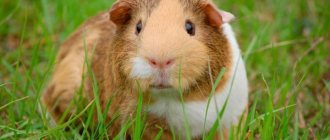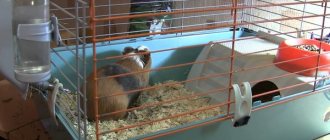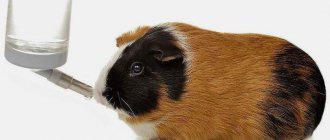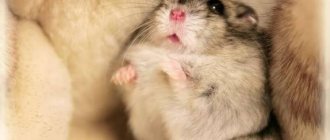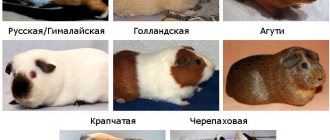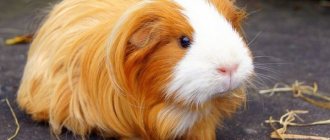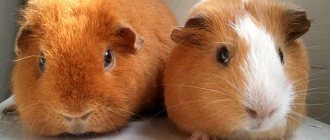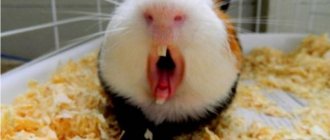Guinea pig sounds and what they mean
Guinea pigs don't talk, but that doesn't mean they can't communicate. Although we are not able to understand all the sounds that they make, and also comprehend all the movements that they make, nevertheless, there is a certain subtext in all this that can provide an invaluable service in achieving mutual understanding with your pet. So, what are some guinea pig sounds?
Sniffles/wheezes/whistles
A satisfied pet often sniffles, and a well-fed pet whistles. While waiting for a treat, the animal may begin to sniffle and gradually switch to whistling. This situation can occur when opening the refrigerator.
If the owner does not get a treat, the pet can also whistle to attract attention to his person and get something tasty.
A prolonged whistle or a whistle repeated after a few seconds by animals can serve as a greeting or signal that they are hungry.
If your guinea pig wheezes when he breathes, he needs to be seen by a veterinarian.
Hums
Rumbling sounds can have a variety of meanings, depending on the position you are currently occupying. If the pig is currently feeling content and happy, then it will emit a guttural rumbling against the background of absolute relaxation and ease. However, if the rumbling sounds have a higher pitch, then the animal is most likely irritated by something. Tension in movements will also indicate this. If you take a closer look at the pet, you can see that it trembles while purring. But abrupt rumbling sounds clearly indicate that your pig is scared or feels uncomfortable.
Squeals or whines
A squeal is a high-pitched squeak that unmistakably signals that your pet is feeling unwell and is overcome by fear and pain. If you hear this sound, be sure to check on your pets to make sure they are okay and no one was hurt. By whining or moaning, guinea pigs want to tell their owners about their irritation or dislike for something or someone, for example, their brothers.
Chirps/Tweets
A guinea pig chirping is a rare occurrence. Not all rodents make such sounds. It really is very reminiscent of birds chirping.
Chirping pets exhibit strange behavior, similar to a state of trance. Typically, a guinea pig sings for no more than 20 minutes, after which it returns to its business.
Scientists who observed animals came to the conclusion that the guinea pig chirps:
- in a state of strong excitement; under stress; after a quarrel with relatives or being socially overloaded.
Guinea pig sounds and their meaning
Guinea pigs are highly social animals that exhibit a wide range of behaviors. These small animals only seem quiet and inconspicuous in appearance, but just try not to feed this “quiet” creature on time, and you will immediately hear who is boss and where the crayfish spend the winter!
Guinea pigs are active, inquisitive and very talkative animals. Every sound a pig makes has a meaning, so knowing the meaning of all your pig's "pew-pew" and "wee-wee" sounds will help you understand your little friend better.
You can tell when your pet is happy, sad, excited or scared.
The sounds of guinea pigs cannot always be interpreted with 100% accuracy, since each pig has individual characteristics. For example, some pigs may show happiness by purring, while other pigs' purring may indicate anger or displeasure.
Generally speaking, it is much easier to classify guinea pig sounds into two categories - positive sounds and negative, alarming sounds . The most common sounds in both categories are listed below. We hope these examples will help you understand the piggy language. Well, or at least understand the basics of spoken pig speech.
Positive Guinea Pig Sounds
purring
A low, soft purr usually indicates that the pig is well and happy. Such sounds can most often be heard when the pig is basking in your arms or you are petting it. This sound indicates that the pig is comfortable in your arms.
May be accompanied by slightly noticeable chewing movements. If pigs purr at each other in this way, accompanying the purring with rocking movements or a nose-to-nose stance, this usually means a conversation to find out who will occupy the house, who will get a female pig, who the owner will take in his arms, or which of them is more important.
This is what a happy and contented guinea pig “sounds” like
Sometimes a similar sound can mean fear. Especially if the sounds are short and abrupt, and the pig froze in a motionless, tense position.
Squealing
This is a high pitched sound that is used by guinea pigs, especially to communicate with us humans. Loud squeals in guinea pigs most often symbolize anticipation and excitement. Most often, pigs attract the attention of the owner with such loud sounds. Like, “Feed me already!”
In case you feed your guinea pig at certain times of the day (and this is basically what you should do), the little guinea pig will become more and more agitated closer to feeding time and may even try to get your attention ( did you forget about lunch?).
Guinea pigs are quick to learn, and if you respond to such a call once, be prepared to hear this sound regularly. Conditioned reflex in action.
cooing
A purr-like sound that sounds like a series of short sharp and fast sounds indicates that your guinea pig is happy and in a blissful state. The same sound is made by females receiving the courtship of a male.
This type of cooing is also often associated with physical activity, exploring new places, or playing. The main thing is that the pig feels good at these moments.
At first glance, there is no particular difference between these two sounds, but the experienced ear of a sensitive owner will detect a slight difference.
Language of the body
Guinea pigs can also communicate through body language. If you understand this language, you will receive the keys to understanding what is happening to your pet.
When juveniles are particularly happy, excited, or in a playful mood, they like to jump up and down. Although this behavior is also typical for older representatives of the species. However, they don't jump that high.
Numbness often occurs at a moment of great surprise or doubt about something. Then she will stand still.
Sniffing is a way for guinea pigs to assess what is happening around them. In addition, this is how they recognize each other by sniffing the area around the nose, chin, ears or backside. And if they want to greet their brother in a friendly way, then they touch each other’s noses.
Showing aggression, a guinea pig tries to rise above its opponent, raising its head and standing on stiff legs. In addition, they sway menacingly from side to side, their fur stands up, and their mouth distorts into a grin. To enhance the effect, rodents can also hiss and grind their teeth. If you notice this behavior in your pets, be on the lookout. You may have to intervene in their relationship to prevent a fight.
If an animal swaggers, sways from side to side on stiff legs, and even grinds its teeth, this may be a sign of aggression. Although during the mating season, pompous behavior towards an individual of the opposite sex is an element of courtship.
Guinea pigs love to mark their territory. To do this, they rub their chin, neck or backside against the objects they want to get.
The desire to rise up manifests itself either during sexual relations between males and females, or at the moment of the formation of a hierarchy within the social structure of guinea pigs when kept in groups.
If your guinea pig is handled, it may show signs of anxiety and agitation. This may indicate that she wants to go to the toilet or that she is simply tired of playing with you. Be that as it may, you should return your pet, at least for a while, back to the cage.
Throwing back the head can be observed in spoiled guinea pigs at the moment of irritation. This way they can ask their owner to stop.
If a rodent begins to lick its owner, many consider this a sign of love. Maybe that's true, or maybe they just like the taste of salt on your skin.
They also love to be picked up by their owner out of their cage. Although at first the pigs show timidity, this is not at all because they do not want to play with the owner, but because a natural defense mechanism is manifested in them. It won't be long before she wants to cuddle up to you.
Article on the topic: A complete guide to the care and maintenance of a guinea pig
Guinea pig alarm sounds
To express anxiety, excitement and dissatisfaction, guinea pigs also have a set of unique sounds. Such sounds should alert an attentive owner. It would be good to find out the cause of anxiety or dissatisfaction as quickly as possible in order to quickly reduce discomfort or eliminate the threat.
Discontent
Most often, pigs express their dissatisfaction with the help of a kind of gnashing of their teeth. If you hear such a sound, this is the first sign that your pig is not happy about something or is agitated. The reason could be anything: a showdown with relatives, a new person, an unfamiliar environment, sudden loud sounds, etc.
Teeth chattering and clicking indicate that the pig is angry and ready for a possible attack (occurs when two males meet). You can also hear this sound when your pig is scared. Usually such a sound is addressed to another pig, but sometimes a person can hear it addressed to himself (“I don’t want to take any more medications!” ;))
If two guinea pigs are meeting for the first time, this sound may be a sign of dominance.
Please remember this sound so you can be on your guard in case something happens. If two guinea pigs are chattering their teeth at each other, this is a sign that there is a problem and separation or temporary housing is the best solution.
Most often, such “showdowns” arise when pigs cannot divide the territory, feeder, or one cucumber between two. Or when they introduce a new friend.
When should you be wary?
So, the same sound can mean both good and bad emotions; you need to delve into the context of what was “said.” Look at the environment, at the events that preceded the sound.
List of sounds that you should be wary of when you hear them:
- The animal squeaks shrilly. If no external irritants are found that need to be eliminated, the animal should be taken straight to the veterinarian.
- Grinding of teeth almost always means problems with chewing function. It is necessary to examine the animal's teeth. An infection can settle there. Only a veterinarian can see this.
- The loud cry of a rodent means that the animal is scared and in danger. Stress factors for the pig must be eliminated, otherwise it can become seriously ill.
- Wheezing when breathing is also a reason for urgent medical attention.
Each animal can bring personality and express special emotional notes. The squeak of a guinea pig is an expression of a palette of feelings. Recognizing them is a difficult but interesting task.
Source
